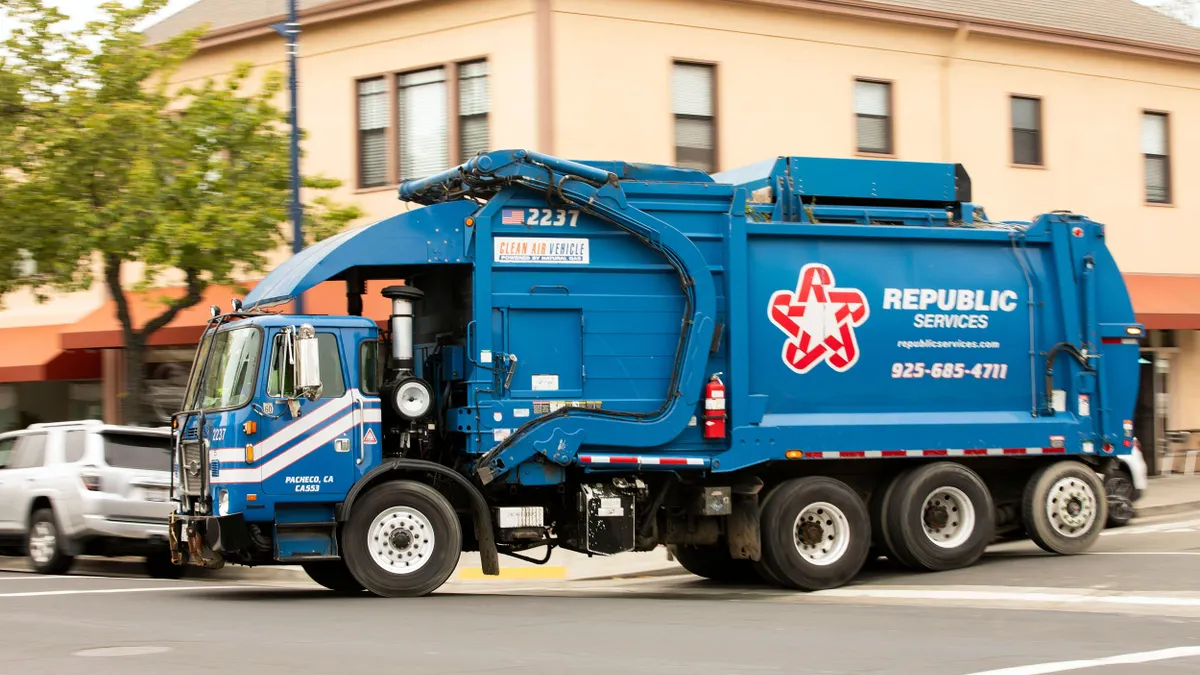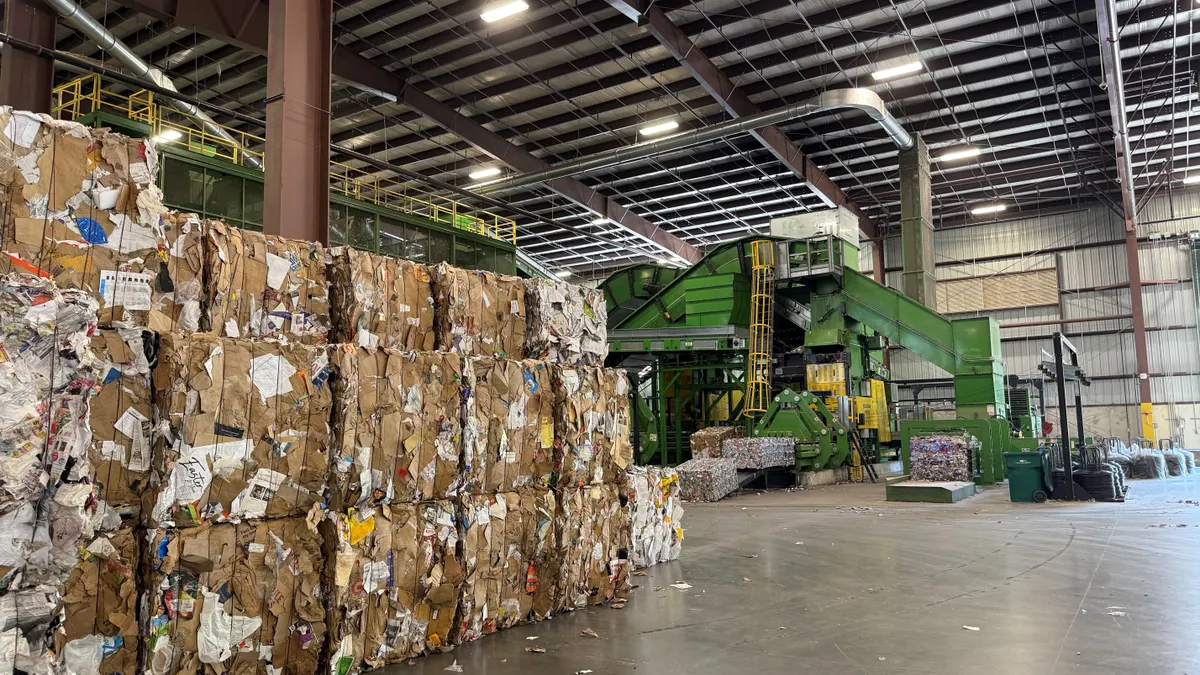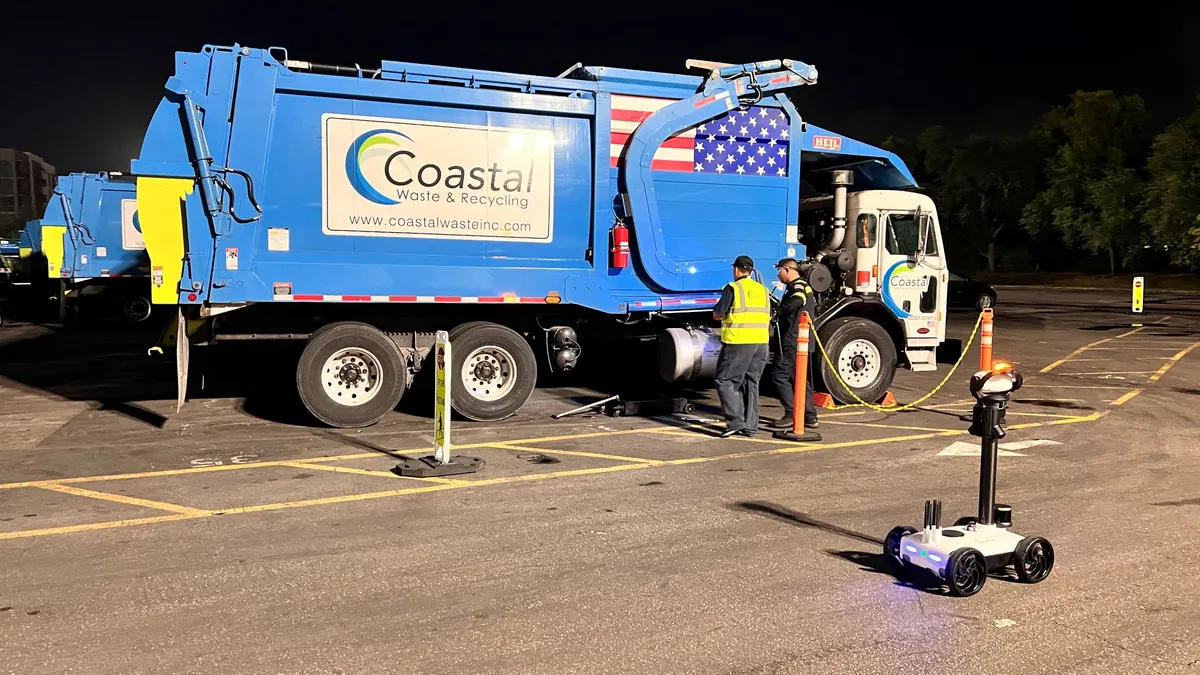Momentum to reform New York's commercial waste industry has been building for years, and that process formally entered a new phase last week with the release of a proposed franchise zone plan. Now, if the city's proposal receives legislative approval, the ensuing implementation process will arguably be even lengthier and more arduous.
Waste Dive has covered the incessant back-and-forth between all involved and will continue to do so in the years ahead — but beyond the bevy of press release reactions, we're most interested in how this new proposal will shape the conversation going forward. New York's Department of Sanitation (DSNY), along with a team of consultants and advisory board members, is trying to achieve the best of both worlds with many of its plans. However, sizable opposition remains.
Here are seven key questions we'll be asking as the debate continues into 2019.
Who stands to benefit?
It's far too early to declare which companies would profit most from this system if it comes to fruition, but the inclusion of certain language in the proposal already indicates multiple opportunities.
- The plan claims to create options for every company, "from small, family-operated firms to large international corporations." However, the latter remain best-positioned in terms of access to capital. Waste Connections is currently the only national company that still has trucks on the streets and has confirmed interest in the possibility of a franchise system.
- That doesn't mean other large players in the market with their own access to capital don't stand a good chance of winning zones. Smaller players also technically still have a shot, though they may be better off forming a joint venture or consortium to stand out in the bidding process.
- Brokers, once expected to be cut out, will now also have the chance to bid. Dozens are currently approved to operate in the city, but this bodes especially well for Rubicon Global and Recycle Track Systems. Both companies may eschew the broker label, but they've been part of the zone advisory board as such and hold additional insight as a result.
- Subcontractors will also have a chance to potentially provide services for specialized recycling collection, education and outreach, or other functions. This could be a boon for many city start-ups, particularly in the organics sector.
- Fleet technology companies, which have already been circling recent New York safety events, also stand to cash in. DSNY will require GPS tracking and routing software at a minimum, but the installation of cameras or other features will help companies make their bids more attractive.
- DSNY itself, once seemingly reluctant to take a lead role in this franchise process, could now create a brand new Division of Commercial Waste to manage it. This will mean additional budget funding, potential hiring of new sanitation police and even greater authority over the local market.
Are non-exclusive zones now the exclusive option?
Confirming previous reporting, the DSNY proposal carves up 20 non-exclusive zones, each with three to five carters, that could result in as many as 68 potential contract awards.
When first discussing this proposal last spring, DSNY cited the need to maintain customer choice and said its consulting team had found minimal difference between exclusive and non-exclusive in terms of emissions reductions. The proposal, as well as a supporting appendix that details various scenarios ranging from 15-30 zones, projects this new system will achieve a 63% reduction in vehicle miles traveled.
While the plan claims this will eliminate the days of a single block seeing 400 trucks roll by, or one strip mall being serviced by five different companies, the system will inevitably still keep more trucks on the road than an exclusive set-up. Transform Don't Trash, the coalition of labor and environmental advocates that have been backing this concept for years, continued to push for an exclusive system in its statement following the proposal's release last week.
The appendix points to three California cities that have nonexclusive systems — Long Beach, Sacramento and San Diego — but found that far more have taken the exclusive route. Every city's needs are different, and New York's may be the most unique of all, but this would make it an outlier if the program proceeds as planned.
Is there any way prices don't go up?
New York's commercial waste industry is regulated by a strict rate cap, which has kept pricing much lower than in many comparable metropolitan areas. The potential jump in pricing has been a primary concern for large business interests opposed to the plan, such as the Real Estate Board of New York (REBNY). As a result, DSNY plans to make pricing count for 40% of the RFP point structure and will create a system allowing carters to bid under various rate caps on a local basis.
While the plan recognizes some requirements and existing regulatory factors may cause pricing to go up, it also argues long-term contracts will create greater efficiencies that could drive it down. While the plan will allow haulers to propose "supplemental charges," this does not include line items such as opening or unlocking gates. This appears to be a direct nod to the situation in Los Angeles, where a minority of customers have seen highly expensive access fees tacked onto their bills. Also similar to Los Angeles, an argument can be expected from franchise supporters that the city's low pricing comes at the expense of labor and environmental standards, and may need to go up regardless.
Can this plan move the needle toward "zero waste"?
Given the commercial sector generates as much, if not more, material than New York's residential buildings, it was identified as a key area of focus in the city's 2015 OneNYC plan.
While this proposed system won't cover a variety of commercial categories, such as construction and demolition debris, it still encompasses a large chunk of material with greater potential for recycling that could help advance progress toward the city's 2030 "zero waste" target. As a result, DSNY now says the proposal "represents the City’s greatest opportunity to achieve this goal."
All contracted service providers will be required to provide recycling and organics collection service, whereas only certain commercial generators are currently covered by the city's organics diversion mandate. Rates for these two services will also have to be lower than for refuse collection, which can also be expected to become a point of contention for industry groups.
Recognizing current market conditions, DSNY has previewed a commodity-based scale to calculate these rates. Precise details are expected to come with the RFP, though this already marks a shift from the more recent Los Angeles example where "blue bin" recycling service is free and mandatory diversion targets are written into the contracts.
While this may seem like a more pragmatic approach from the city's standpoint, the lack of hard diversion targets is another sore spot for advocates. One area which should please them is the potential for partnerships with food rescue organization and other specialized subcontractors. This type of targeted approach, with a focus on upstream reduction or rescue, has proven successful in other franchise systems.
Can this modernize local infrastructure?
While DSNY is hoping to see infrastructure commitments through the RFP process, and will require all companies to specify where they're taking material, it's currently unclear how this will spur new growth in processing capacity.
The need for more regional organics sites has been a long-running point of contention,with some saying there aren't enough as is, and additional MRF capacity may be needed if collection volumes increase. Given the Closed Loop Fund was listed as part of the city's zone advisory board, some amount of outside investment could be expected in bid packages.
On the fleet side, DSNY will also be giving "higher consideration" to companies that outline plans for "the adoption of alternative fuel vehicles, including compressed natural gas and electric trucks, or other fuel efficiency measures," though the city will not be setting specific fleet specifications beyond an imminent 2020 requirement that all vehicles meet 2007 standards.
This stands in contrast with the mandated launch of 469 clean fuel vehicles and counting in Los Angeles, along with similar requirements in other West Coast cities. Short of future legislative requirements, it's possible that a contract winner could still be running 2007 vehicles well into the 2020s.
Will franchising create safer working conditions?
Transform Don't Trash and its allies have long held up franchising as the best and only option to improve safety in New York's commercial waste industry, arguing shorter routes and more defined working conditions are key to achieving better standards. Still, there are lingering questions about what the city could do beyond recent NYPD traffic violation crackdowns and enforcement of current state or federal regulations.
A key part of this debate has also been just how dangerous current industry conditions are for workers and city residents. The NYPD, city comptroller's office and other media outlets have attributed a varying range of fatalities to the industry, but DSNY now puts the number at 26 since 2010. The agency used Business Integrity Commission data as its main source, which is the same information Waste Dive published in July.
Now, DSNY's proposal includes more concrete details on how franchising could potentially raise safety standards. Bidders will be reviewed based on their safety records over the past three years and will be expected to submit detailed training plans. All contracted service providers will also be required to comply with existing labor laws and provide personal protective equipment.
Likely inspired in part by a 2018 series of Pro Publica stories, the proposal would also prohibit companies from employing off-the-books "third men" (such as an individual whose death was covered up by one company in 2017). The city would also review any collective bargaining agreements, as well compliance with wage and hour laws, to ensure "fair and honest worker representation" in all unions. The industry's two main unions, Teamsters Local 813 and Laborers Local 108, have questioned the legitimacy of other "rogue" unions for many years.
Given proposed non-franchise reform legislation that the industry says could improve conditions sooner, and the ongoing back-and-forth over voluntary safety events, this will likely remain one of the most publicly contentious elements of the plan. Labor advocates will want to see specific RFP language about minimum wages, benefits and safety standards before officially signing off.
Can it pass in the New York City Council?
DSNY's next move will be to hold public hearings, conduct an environmental review and prepare legislation for introduction to the council. Those final steps remain a critical piece that could potentially derail the entire process before an RFP is ever released. So far, DSNY appears to have lined up key support.
Antonio Reynoso, chair of the council's sanitation committee, has been a long-time proponent and will likely sponsor the legislation. Speaker Corey Johnson, along with nine other council members, also tacked their names onto the DSNY press release with supportive statements. Absent from that list were any members from the Bronx or Reynoso's committee.
This leaves 40 other potential votes to lock down, though the six members who have co-sponsored the industry-backed reform bill may be hard to sway. Johnson's support is key, and the legislation's chances are likely favorable, but we can still expect a significant kick-up in lobbying activity heading into the new year.
While the Solid Waste Association of North America is unlikely to take a position – and was in fact quoted in the DSNY press release – the National Waste & Recycling Association and New Yorkers for Responsible Waste Management have reaffirmed their opposition. REBNY, the Building Owners and Managers Association, local chambers of commerce and other business groups have also come out against the proposal. On the other side, multiple environmental groups and the Teamsters can be expected to remain particularly vocal in their support of its passage.
What do you think about the plan? We're always glad to receive feedback emails via waste.dive.editors@industrydive.com.



















